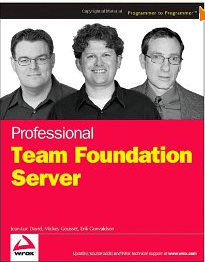Visual Studio and TFS Books
I’m asked fairly frequently which books I recommend about Visual Studio or TFS, so I decided to write some words about it to see if I get this asked less frequently.
Before Visual Studio 2010 there were not a great number of books that I (could) recommend. If a person wanted to have a light yet complete view out TFS was all about then I would recommend Richard Hundhausen introductory book Working with Microsoft Visual Studio 2005 Team System (Pro-Developer) (this was the first I ever read about Team System (I’ve read the edition it was still targeting Team System Beta and was still called Introducing Visual Studio 2005 Team System Beta Edition (Pro-Developer)))

If you wanted a general book on TFS that covered the entire platform and with a great level of detail then I would recommend THE book Professional Team Foundation Server . A book which was not only very complete, but it also had a lot of gory details on how to do things on TFS that you couldn’t find anywhere else (for a long time).
if you wanted to learn how to do some project management with TFS then the book to recommend was Managing Projects with Microsoft Visual Studio Team System.
There was also a book that I would somehow recommend Global Outsourcing with Microsoft Visual Studio 2005 Team System (the title is somehow misguiding) the book isn’t great, but I would recommend it since it contained some code samples from which I’ve learned a few tricks (this was in a time the documentation for TFS object model was pretty scarce).
And that was it. There were some more books but I can’t remember any that I would recommend (either I’m being unfair because my memory is foggy or I can’t remember any because there wasn’t anything else to me memorable enough so I have a recollection that I would recommend it![]() ).
).
For the 2010 release, things have changed. There are a lot of great books, and there a bunch a of them that I would recommend without hesitation.
If you want a generic book, that covers the entire Visual Studio ALM stack, then the book to get is Professional Application Lifecycle Management with Visual Studio 2010. It is a great book that covers the entire Visual ALM family from toe to toe. This is an amazing book that has been able to cover in more than 600 pages, every major area and feature of Visual Studio. Both the IDE (including features from all SKUs) and the server (TFS including lab management). Highly recommended.
Disclosure: I have two copies of this book. One that I bought and another that has been sent to me by the Publisher so I could review it.
If build automation is your kind of thing, then THE book about builds is Inside the Microsoft Build Engine: Using MSBuild and Team Foundation Build. It is a great book on MSBuild and building with TFS. The second edition has been greatly enhanced with information about Team Build 2010 and has a bonus it has a nice chapter on MSDeploy to be used in conjunction with Team Build (or independently)
Disclosure: I have written a small commentary that has been included in the book based on a review that I did before the book was published
If you are interested in learning more about testing with Visual Studio, then no list of books would be complete with referencing Software Testing with Visual Studio 2010. The intended audience of this book is not developers but people who primarily test software (traditionally there has been a great gap between testers and developers. A gap that Visual Studio team is working hard to reduce). I still haven’t finished reading the book, so I can give you my full impression about it. But from what I’ve it is a great book, although it could have gone a little deeper and provide more details on some topics. Overall it is a great book
Last but not the least is Professional Team Foundation Server 2010. I can’t give you a first hand opinion on this one because my copy hasn’t arrived yet. This book focus solely on TFS, although I haven’t read it yet I can recommend it without even reading it since I personally know all the authors but one and I’m pretty confident in recommend it since they are unable to produce something that isn’t great.
In summary (in no particular order)
- Professional Application Lifecycle Management with Visual Studio 2010
- Inside the Microsoft Build Engine: Using MSBuild and Team Foundation Build
- Software Testing with Visual Studio 2010
- Professional Team Foundation Server 2010
I’m sure there are other books out there that are equally good, but I’m not aware of them (yet.![]() )
)
